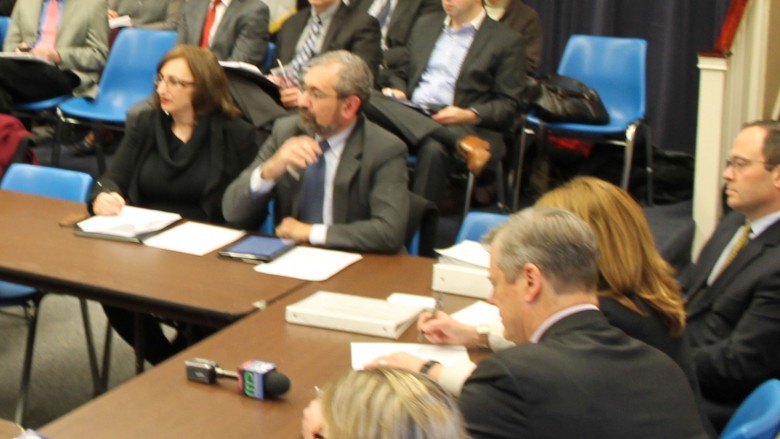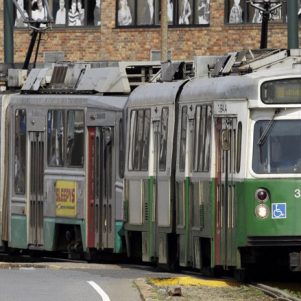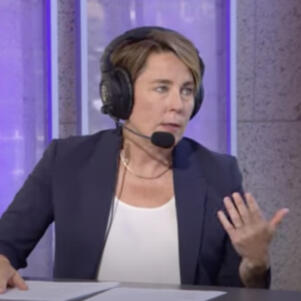Mass. school leaders rap Baker on charter push
By State House News Service | February 9, 2016, 16:45 EST
 Framingham School Committee Chair Beverly Hugo and King Phillip Regional School Committee member Patrick Francomano challenge Baker’s education budget at Local Government Advisory Commission meeting. (State House News Service photo by Antonio Caban/SHNS]
Framingham School Committee Chair Beverly Hugo and King Phillip Regional School Committee member Patrick Francomano challenge Baker’s education budget at Local Government Advisory Commission meeting. (State House News Service photo by Antonio Caban/SHNS] BOSTON – Local school officials directly challenged Massachusetts Gov. Charlie Baker’s commitment to traditional public education on Tuesday, confronting him over his administration’s focus on expanding access to public charter schools and drawing a strong rebuke from the governor.
Baker’s budget proposal for next year would increase local Chapter 70 education funding by 1.6 percent, despite 4.3 percent projected growth in state tax revenues. Unrestricted local aid would grow at the same rate as revenue in Baker’s budget, but other accounts for special education and school transportation would be level funded.
“The administration’s public focus is overwhelmingly on charter schools, and while our excellent vocational schools have also received your attention, the majority of public school students are not significantly helped by this budget,” King Phillip Regional School Committee member Patrick Francomano told the governor during a meeting with local officials.
Francomano, the immediate past president of the Massachusetts Association of School Committees, said the group is also concerned that Baker and his team “ignored” the recommendations of a 21-member Foundation Budget Review Commission, which held extensive meetings and suggested making formula changes to address the growing costs of the “two biggies” – health care and special education.
“Some of our constituents say that the administration’s commitment to true public education is disingenuous, while others say we are failing to fulfill our constitutional obligation. We are hoping very sincerely that we can continue to work together to assist and improve public education for all of the students,” Francomano said.
Baker, who attended the meeting of the Local Government Advisory Commission with Lt. Gov. Karyn Polito, took immediate exception to the comments, defending his administration’s record on education funding.
“I reject categorically the notion that somehow this administration isn’t interested in supporting public education, because I think the track record on that is clearly the opposite,” Baker said.
Polito also noted increased funding in the budget for kindergarten grants that would help 270 school districts, including 120 that did not receive kindergarten expansion funding in fiscal 2016, and the proposed capital investment in separate legislation for vocational and technical high schools.
The exchange took place during a discussion between Baker and local officials who were providing feedback to the governor on the fiscal 2017 budget blueprint he rolled out last month.
Brookline Town Administrator Mel Kleckner said local leaders “strongly support” the concept of “revenue sharing” that Baker implemented by increasing unrestricted local aid at the same rate that revenues are expected to grow.
Kleckner, however, said the 1.6 percent increase in Chapter 70 aid would only bring 78 cities and towns to foundation level funding, and said there is concern about the “lack of progress” in implementing changes to the foundation budget formula.
“We understand those recommendations can’t be implemented overnight, but we support a start and we want you to know that we will be advocating in the legislative process for a funding increase,” he said.
Baker said he would be “happy” to have a conversation about reforming the Chapter 70 foundation funding formula, but said the recommendations put forward by the commission “haven’t been tested yet” or discussed at the legislative level.
“I just flat out reject the notion that we’re not interested in public education. I’m a product of public schools. My kids are a product of public schools. (The lieutenant governor’s) kids are a product of public schools. And the public schools in Massachusetts continue to outperform public schools all over the rest of the country, which is great, but our single biggest issue as a commonwealth is the opportunity gap or the achievement gap,” Baker said.
Beverly Hugo, vice president of the Massachusetts Association of School Committees and chair of the Framingham School Committee, said Baker’s budget also failed to fully fund charter school and regional school transportation reimbursements for districts.
“How can we discuss a cap lift when the promise of amelioration efforts have not been met,” she said.
Hugo said the MASC wants “real reform” of charters including protections for sending districts and students from selective enrollment practices, “counseling out” of male students, and what she called a failure to serve a cross-section of students by “slyly using data from two or three charters” to prop up averages for some schools with a poor track record of enrolling “troubled,” low-income and limited English students.
“We recognize that other people’s needs are great in the human service area, and we feel this argues persuasively for greater state revenue to address these needs,” Hugo said.
Massachusetts Municipal Association Executive Director Geoff Beckwith, both during and after meeting, sought to distance his group from the comments made by members of the Association of School Committees.
“In no way do we question the administration’s support for public education,” Beckwith said.
Beckwith agreed with the need to update the foundation budget formula for schools, explaining that even though Baker proposed to fully fund the formula increase, the Chapter 70 allocation under the formula does not keep pace with the cost of maintaining educational services.
In an interview with the News Service after the meeting, Baker did not dispute the characterization that the school funding formula needed adjustment, describing that as “a conversation we’re happy to have.”
“The big problem you run into on that one is that there are puts and takes on any formula over time and the hard part on this one is any change in the formula that would reduce the amount of money we spend on something is going to be very hard to get people to agree with and as a result the formula tends to stay where it is year over year,” he said.
Baker did tell the local officials that the Department of Elementary and Secondary Education will soon publish an update to the waiting list for charter schools that should eliminate any concern over double counting students or failure to remove students who are happily enrolled in a district school.
“Whether 37 or 35 or 34 thousand, it’s still 37, 35 or 34 thousand. It’s not 12,” Baker said.
Baker has made lifting the cap on charter school enrollment a priority for his second year in office.
Written by Matt Murphy










